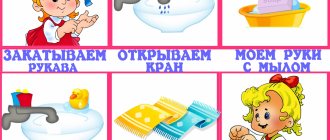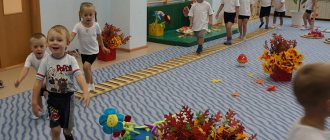Article “The importance of finger games in the life of a modern preschooler”
The importance of finger games in the life of a modern preschooler
Currently, the full development of children from preschool age is becoming an urgent problem. Developed fine motor skills play an important role in the success of a child’s intellectual and psychophysical development.
At all stages of a child's life, hand movements are very important. The most favorable period for the development of a person’s intellectual and creative capabilities is from 3 to 9 years, when the cerebral cortex has not yet been fully formed. It is at this age that it is necessary to develop memory, perception, thinking, attention.
In the 20th century researchers such as L.S. Vygotsky, A.R. Luria, A. Vallon, J. Piaget, L.A. Wenger, E.G., Pilyugina, M.M. Koltsova et al. proved that sensorimotor development forms the foundation of mental development. Psychologists note that mental abilities begin to form very early and not by themselves, but as the child’s activities expand, including general motor and manual activities.
The higher the child’s motor activity, the better his speech develops. The relationship between general and speech motor skills has been studied and confirmed by the research of many major scientists, such as I. P. Pavlov, A. A. Leontiev. When a child masters motor skills and abilities, coordination of movements develops. The formation of movements occurs with the participation of speech.
Insufficient development of gross and fine motor skills, visual perception, and attention can lead to developmental delays in the child, problems in interaction with adults and peers and, as a result, to a negative attitude towards kindergarten and then to school.
Famous physiologist I.P. Pavlov believed: “The hands teach the head, then the wiser head teaches the hands, and skillful hands again contribute to the development of the brain. We can conclude: the development of thinking begins with the hand.”
.
Overcoming fine motor skills disorders, developing and improving a complex of fine motor skills, strength, coordination, accuracy, plasticity of movements of the hand and fingers becomes of utmost importance when working with preschoolers. It is necessary to create conditions for the child to accumulate motor and practical experience in developing manual skills.
The history of finger games is very ancient. The influence of manual (manual) actions on the development of the human brain was known back in the 2nd century BC. in China. The ancient Chinese claimed that exercises involving the hands and fingers harmonize the body and mind and have a positive effect on brain activity. That is why, starting from an early age, finger gymnastics is used in all preschool institutions in China. Japanese acupuncture is another proof of this. There are many reflex points on the hands, from which impulses go to the central nervous system. Japanese doctor Namikoshi Tokujiro developed a healing technique for influencing the hands, and through them, the internal organs of a person, reflexively connected with them.
A puppet theater dating back to the 16th century was found during excavations in Egypt. BC, in India - by the 11th century. Also, almost all Roman houses had dolls.
The priority for recognizing finger games as official pedagogy belongs to German specialists. Back in 1873, the outstanding German teacher Friedrich Froebel highlighted the educational significance of finger games and included them in the curriculum of the kindergartens he created. Froebel suggested that it was the association of the sound and meaning of words with the child's own body that best suited the learning style of young children. At that time, there could be no theoretical justification for this method; Froebel made conclusions based on his own observations and intuition.
Nowadays, it is unlikely that any parents or teachers will have a question, why is finger gymnastics needed?
Finger games and exercises are an indispensable tool for those who work with children of any age. The hand is an organ of speech, scientists believe, however, even without studying scientific treatises, you can notice when we communicate with each other, trying to more accurately convey our thoughts to the interlocutor, we help ourselves with finger movements and gestures.
When working with young children, children's problems such as poor development of the hands, poor memory of colors and shapes, impaired hand motor skills are identified; in such children, slowness in performing movements predominates, and stiffness is observed. As a result, children awkwardly hold a spoon, cannot fasten buttons, or lace up shoes. It can be difficult for them to collect the scattered parts of the construction set or play with large puzzles.
Famous teacher V.A. Sukhomlinsky said: “The mind of a child is at the tips of his fingers,” “The hand is the instrument of all instruments,” Aristotle concluded. “The hand is a kind of external brain,” Kant wrote.
These findings are not accidental. Indeed, the hand has a large “representation” in the cerebral cortex, so finger gymnastics is of great importance for the development of the child. One of the most common types of finger gymnastics is finger games.
In recent decades, there has been an increasing interest in the development of fine motor skills, in particular in its applied aspect. The search, revival and creation of games and exercises aimed at developing subtle differentiated movements of the fingers is underway. The most effective among them are finger games. They develop not only fine motor skills, but also activate speech, attention, memory, thinking, improve spatial organization, and are a powerful means of increasing performance. In addition, they are one of the methods for developing graphic skills and movements for writing.
Previously, there were many folk finger games, nursery rhymes that accompanied the childhood of our great-grandmothers and grandmothers, games that are now forgotten or half-forgotten. Over the last decade, experts have been searching for and reviving such games, turning to ethnographers, folklorists, philologists for help, using specialized literature, and conducting surveys in various regions of Russia. Many of the newfound games are not outdated and are naturally perceived by children. The child encountered folk finger games already in the cradle, or rather, on the lap of his mother, grandmother, or nanny. These were not games yet, but nursery rhymes and nursery rhymes - fun between an adult and a child.
Recently, unfortunately, parents have not paid enough attention to the development of fine motor skills in their children’s hands. Insufficiency of motor functions in children is manifested in all components of motor skills: in general, in fine movements of the hands and fingers, in facial and speech motor skills. This leads to poor coordination of movements in complex self-care activities, in labor processes, and causes difficulties in mastering manual operations (writing, drawing, affects the expression of facial expressions and pantomimes, the formation of the expressive side of speech, correct and clear sound pronunciation).
The problem of correction and elimination of violations must be considered from the perspective of improving and enriching a properly organized physical education and correctional developmental environment.
In accordance with the Federal State Educational Standard for Additional Education, the educational area “Physical Development”
includes solving the problem of developing gross and fine motor skills of both hands, since when children develop fine motor skills of their fingers, it has a great impact on the development of their speech, the manifestation of various deficiencies is reduced and even mental stress is relieved. The Federal State Educational Standard for Preschool Education also assigns an important role to play - a special activity of the child, through which he organically develops and learns the culture of human relationships. From this point of view, finger games are an ideal way to develop and entertain a child at the same time.
Finger gymnastics classes will help your child learn to be a real master of his fingers, perform complex manipulations with objects, and therefore climb another step on the steep ladder leading to the heights of knowledge and skills.
MAGAZINE Preschooler.RF
The importance of finger games in the life of a modern preschoolerCurrently, the full development of children from preschool age is becoming an urgent problem. Developed fine motor skills play an important role in the success of a child’s intellectual and psychophysical development.
At all stages of a child's life, hand movements are very important. The most favorable period for the development of a person’s intellectual and creative capabilities is from 3 to 9 years, when the cerebral cortex has not yet been fully formed. It is at this age that it is necessary to develop memory, perception, thinking, attention.
In the 20th century researchers such as L.S. Vygotsky, A.R. Luria, A. Vallon, J. Piaget, L.A. Wenger, E.G., Pilyugina, M.M. Koltsova et al. proved that sensorimotor development forms the foundation of mental development. Psychologists note that mental abilities begin to form very early and not by themselves, but as the child’s activities expand, including general motor and manual activities.
The higher the child’s motor activity, the better his speech develops. The relationship between general and speech motor skills has been studied and confirmed by the research of many major scientists, such as I. P. Pavlov, A. A. Leontiev. When a child masters motor skills and abilities, coordination of movements develops. The formation of movements occurs with the participation of speech.
Insufficient development of gross and fine motor skills, visual perception, and attention can lead to developmental delays in the child, problems in interaction with adults and peers and, as a result, to a negative attitude towards kindergarten and then to school.
Famous physiologist I.P. Pavlov believed: “The hands teach the head, then the wiser head teaches the hands, and skillful hands again contribute to the development of the brain. We can conclude: the development of thinking begins with the hand .
Overcoming fine motor skills disorders, developing and improving a complex of fine motor skills, strength, coordination, accuracy, plasticity of movements of the hand and fingers becomes of utmost importance when working with preschoolers. It is necessary to create conditions for the child to accumulate motor and practical experience in developing manual skills.
The history of finger games is very ancient. The influence of manual (manual) actions on the development of the human brain was known back in the 2nd century BC. in China. The ancient Chinese claimed that exercises involving the hands and fingers harmonize the body and mind and have a positive effect on brain activity. That is why, starting from an early age, finger gymnastics is used in all preschool institutions in China. Japanese acupuncture is another proof of this. There are many reflex points on the hands, from which impulses go to the central nervous system. Japanese doctor Namikoshi Tokujiro developed a healing technique for influencing the hands, and through them, the internal organs of a person, reflexively connected with them.
A puppet theater dating back to the 16th century was found during excavations in Egypt. BC, in India - by the 11th century. Also, almost all Roman houses had dolls.
The priority for recognizing finger games as official pedagogy belongs to German specialists. Back in 1873, the outstanding German teacher Friedrich Froebel highlighted the educational significance of finger games and included them in the curriculum of the kindergartens he created. Froebel suggested that it was the association of the sound and meaning of words with the child's own body that best suited the learning style of young children. At that time, there could be no theoretical justification for this method; Froebel made conclusions based on his own observations and intuition.
Nowadays, it is unlikely that any parents or teachers will have a question, why is finger gymnastics needed?
Finger games and exercises are an indispensable tool for those who work with children of any age. The hand is an organ of speech, scientists believe, however, even without studying scientific treatises, you can notice when we communicate with each other, trying to more accurately convey our thoughts to the interlocutor, we help ourselves with finger movements and gestures.
When working with young children, children's problems such as poor development of the hands, poor memory of colors and shapes, impaired hand motor skills are identified; in such children, slowness in performing movements predominates, and stiffness is observed. As a result, children awkwardly hold a spoon, cannot fasten buttons, or lace up shoes. It can be difficult for them to collect the scattered parts of the construction set or play with large puzzles.
Famous teacher V.A. Sukhomlinsky said: “The mind of a child is at the tips of his fingers,” “The hand is the instrument of all instruments,” Aristotle concluded. “The hand is a kind of external brain,” Kant wrote.
These findings are not accidental. Indeed, the hand has a large “representation” in the cerebral cortex, so finger gymnastics is of great importance for the development of the child. One of the most common types of finger gymnastics is finger games.
In recent decades, there has been an increasing interest in the development of fine motor skills, in particular in its applied aspect. The search, revival and creation of games and exercises aimed at developing subtle differentiated movements of the fingers is underway. The most effective among them are finger games. They develop not only fine motor skills, but also activate speech, attention, memory, thinking, improve spatial organization, and are a powerful means of increasing performance. In addition, they are one of the methods for developing graphic skills and movements for writing.
Previously, there were many folk finger games, nursery rhymes that accompanied the childhood of our great-grandmothers and grandmothers, games that are now forgotten or half-forgotten. Over the last decade, experts have been searching for and reviving such games, turning to ethnographers, folklorists, philologists for help, using specialized literature, and conducting surveys in various regions of Russia. Many of the newfound games are not outdated and are naturally perceived by children. The child encountered folk finger games already in the cradle, or rather, on the lap of his mother, grandmother, or nanny. These were not games yet, but nursery rhymes and nursery rhymes - fun between an adult and a child.
Recently, unfortunately, parents have not paid enough attention to the development of fine motor skills in their children’s hands. Insufficiency of motor functions in children is manifested in all components of motor skills: in general, in fine movements of the hands and fingers, in facial and speech motor skills. This leads to poor coordination of movements in complex self-care activities, in labor processes, and causes difficulties in mastering manual operations (writing, drawing, affects the expression of facial expressions and pantomimes, the formation of the expressive side of speech, correct and clear sound pronunciation).
The problem of correction and elimination of violations must be considered from the perspective of improving and enriching a properly organized physical education and correctional developmental environment.
In accordance with the Federal State Educational Standard for Preschool Education, the educational area “Physical Development” includes solving the problem of developing gross and fine motor skills of both hands, since when children develop fine motor skills of their fingers, it has a great impact on the development of their speech, the manifestation of various deficiencies and even mental relief are reduced. voltage. The Federal State Educational Standard for Preschool Education also assigns an important role to play - a special activity of the child, through which he organically develops and learns the culture of human relationships. From this point of view, finger games are an ideal way to develop and entertain a child at the same time.
Finger gymnastics classes will help your child learn to be a real master of his fingers, perform complex manipulations with objects, and therefore climb another step on the steep ladder leading to the heights of knowledge and skills.
| Next > |
Finger gymnastics for the whole year for children up to
Finger exercises are an effective way to develop fine motor skills. The importance of finger gymnastics in the development of preschool children
I want to talk about developing fine motor skills finger coordination . Some of you have heard briefly about the importance of developing fine motor skills , others have some knowledge on this topic. The movements of the fingers and hands have a special developmental effect . There are about 1 thousand important biologically active points on the palm and foot. By influencing them it is possible to regulate the activity of human organs.
The influence of the hand on the human brain has been known for a very long time. In the brain, the speech area is located next to the motor area. The famous researcher of children's speech M. M. Koltsov writes: “ The development of hand and speech in people proceeded in parallel, that is, simultaneously. The development of a child’s speech is approximately the same .” Typically, a child who has a high level of development of fine motor skills of the hand can reason logically, has developed memory , attention, and coherent speech. You can conduct an experiment yourself at home: if a 4-year-old child cannot bring a handful of water to his face without spilling it, then his small muscles are lagging behind in development . And, if you feel that fine motor skills are poorly developed , then hoping that he will later catch up with his peer is a wrong position. The weak hand of a preschooler needs to be developed .
Finger gymnastics for children 3-4 years old or exercises for developing fingers is an effective way to develop fine motor skills . It has a positive effect on speech development , and also switches the baby to his bodily sensations, thus calming him. Finger gymnastics for children 3-4 years old enhances the coordinated activity of speech zones and promotes better development of the child’s memory and imagination, and his fingers and hands acquire flexibility and dexterity.
“ Finger games ” are the staging of any rhymed stories or fairy tales using the fingers .
" Finger games " are a very important part of the work on developing fine motor skills . These games are very emotional and exciting. They promote the development of speech and creative activity. “ Finger games ” seem to reflect the reality of the surrounding world - objects, animals, people, their activities, natural phenomena. During “ finger games ,” children, repeating the movements of adults, activate hand motor skills . This develops dexterity, the ability to control one’s movements, and concentrate attention on one type of activity.






